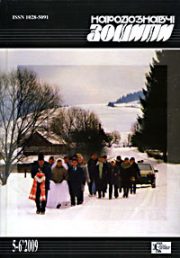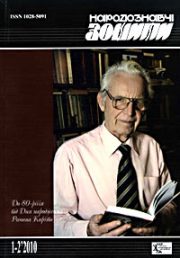The Ethnology Notebooks. 2017, 6 (138), 1439—1445
UDK 398:82.09Franko І.:159.922.4(=186)
DOI https://doi.org/10.15407/nz2017.06.1439
Received 26.10.2017
ETHNIC STEREOTYPES IN THE SCIENTIFIC PERCEPTION OF IVAN FRANKO
Shuma Liliia Volodymyrivna, postgraduate student
at the Department of Ukrainian Folklore Studies named after Filaret Kolessa
of the Ivan Franko National University of Lviv.
Universytetska str. 1, Lviv, 79000, Ukraine.
Contacts: Tel. (032) 2394720; e-mail: filologylnu@gmail.com
Abstract. The article deals with the problem of interethnic relations and ethnic stereotypes in the scientific perception of Ivan Franko as the folklorist. The scientist’s papers of folklore which represents the rooted worldview about ethnic neighbours: «Jew», «Roma», «Pole», «Russian» has been analyzed. This paper shoved Franko’s specific interpretation of folklore text about «ethnic theirs’» and revealed their specifics of plot.
Keywords: interethnic relations, ethnic stereotypes, folklore, «Zhyd», «Tsyhan», «Liakh», «Moskal».
REFERENCES
Belova, O.V. (2005). Etnokul’turnyestereotipy v slavjanskojnarodnojtradicii. Moskva: Indrik. [in Russian]
Franko, I. (1909). Halyts’korus’ki narodni prypovidky (Vol. 3(1)). Etnohrafichnyjzbirnyk, 27. [in Ukrainian]
Franko, I. (1907). Halyts’korus’ki narodni prypovidky (Vol. 2(1)). Etnohrafichnyjzbirnyk, 23. [in Ukrainian]
Franko, I. (1908). Halyts’korus’ki narodni prypovidky (Vol. 2(2)). Etnohrafichnyjzbirnyk, 24. [in Ukrainian].
Hrytsak,Ya. (2006). Prorok u svoijvitchyzni. Frankotajohoievrei. Kyiv: Krytyka. [in Ukrainian].
Hryschenko, I. (2011). Doslidzhennia ukrains’koi kazky «Zhydivs’ka vijna» u naukovomu dorobku Ivana Franka. VisnykL’vivs’kohouniversytetu. Seriiafilolohichna, 55, 123—129. [in Ukrainian].
Krasykov, M. (2004). «Ya ne cholovik, a Nimets’». Fol’klorni materialy. EtnichnaistoriianarodivYevropy: Zb. nauk. pr. (Vol. 17, pp. 126—132). Kyiv [in Ukrainian].
Serdiuk, S.V. (2001). Funktsii etnichnykh stereotypiv ta ikhnia rol’ u formuvanni etnichnoi identychnosti. Naukovizapysky. Teoriiataistoriiakul’tury (Vol. 19, pp. 10—14). Kyiv: Kyievo-Mohylians’ka Akademiia. [in Ukrainian]
Silets’kyj,Yu.R. (2009). Etnichniheterostereotypy v tradytsijnomusvitohliadiukraintsiv. (Dr. hist. sci. diss. abstr.). L’viv: Instytut ukrainoznavstva im. I. Kryp’iakevycha NAN Ukrainy; Instytut narodoznavstva NAN Ukrainy. [in Ukrainian]
Silets’kyj, Yu.R. (2009). Etnichniheterostereotypy u tradytsijnomusvitohliadiukraintsiv (Doctoral dissertation). L’viv: Instytut ukrainoznavstva im. I. Kryp’iakevycha NAN Ukrainy; Instytut narodoznavstva NAN Ukrainy. [in Ukrainian]
Franko, Z. (2001). IvanFranko. Mozaikaiztvoriv, schonevvijshlydoZibranniatvoriv u 50 tomakh. L’viv: Kameniar. [inUkrainian]
Franko, I. (2008). Zhydivs’ka vijna. Prychynok do porivnial’nykh studij nad narodnoiu literaturoiu. In I. Franko, DodatkovitomydoZibranniatvoriv u p’iatdesiatytomakh (Vol. 53, pp. 311—330). Kyiv: Naukova dumka. [in Ukrainian]
Franko, I. (1898). Liudovi viruvannia na Pidhir’iu. Etnohrafichnyjzbirnyk, 5, 160—218. [in Ukrainian]
Franko, I. (2010). Moi znajomi zhydy. In I. Franko, DodatkovitomydoZibranniatvoriv u p’iatdesiatytomakh (Vol. 54, pp. 415—426). Kyiv: Naukova dumka. [in Ukrainian]
Shevchenko, A. (1996). Etnichnyj stereotyp. Mala entsyklopediia etnoderzhavoznavstva (pp. 55—56). Kyiv. [in Ukrainian].
Belova, O.V. (2006). Еtnicheskiestereotipypodannymjazyka i narodnojkul’turyslavjan (Еtnolingvisticheskoeissledovanie) (Dr. hist. sci. diss. abstr.). Moskva: Institut slavjanovedenija RAN. [in Russian]
Vasianovych, O. «Jevrejs’ki kuchky» abo khto vynen u pohanij pohodi? Retrieved from http://ethnography.org.ua/content/yevreyskikuchkyabohto-vynenupoganiypogodi
Hnatiuk, M. (2013, November 15-16). My ne ie antysemitamy. Hovorymo se iavno j odverto: Ivan Franko i halyts’ke ievrejstvo. Den’, 209-210. [in Ukrainian]






